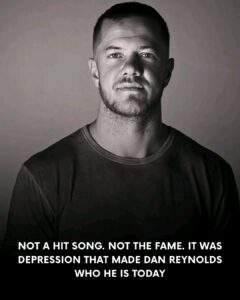
Long before fame found him, Dan Reynolds was a young boy quietly fighting inner battles. This isn’t a story of hit songs—it’s the hidden struggles that fueled them. What really molded the Imagine Dragons frontman might surprise even his most loyal followers.

Before the Spotlight: The Hidden Pain of Dan Reynolds
Long before stadiums echoed with the anthems of Imagine Dragons, Dan Reynolds was just a boy—quiet, introspective, and deeply conflicted.
He wasn’t a prodigy in the traditional sense, nor did he grow up basking in the glow of a supportive spotlight.
Instead, he carried the heavy burden of inner turmoil, one that would eventually shape not just his music, but his entire identity.
Born and raised in Las Vegas, Reynolds grew up in a large Mormon family.
His early life was rooted in the teachings of the Church of Jesus Christ of Latter-day Saints, which provided structure and community but also presented intense expectations.
From a young age, he struggled with anxiety and depression—feelings he couldn’t always understand or express, especially in a culture that often encouraged emotional restraint.
Behind the smiles in family photos was a child who felt different, disconnected, and weighed down by a sense of shame he couldn’t quite name.
Reynolds’ first real escape came through music. As a teenager, he picked up the guitar and began writing songs—not for fame, but for survival.
Music became his outlet, the only place he could safely channel the emotions that felt too dangerous to speak aloud.
But even as he discovered his voice, the internal battle continued.
Depression didn’t disappear just because he had a melody to pair it with.
In fact, the deeper he dove into his emotions, the more intense the battle became.
College and young adulthood brought more challenges. Reynolds enrolled at Brigham Young University, continuing to walk the line between his faith and his personal truth.
He served a full-time Mormon mission, as expected of young men in his church, but he returned with more questions than answers.
It was during this time that he truly began to confront the disconnect between the version of himself he showed the world and the version he struggled with behind closed doors.
Forming Imagine Dragons was a turning point, but not a cure.
As the band rose to fame with hits like “Radioactive” and “Demons,” Reynolds was still fighting personal darkness.
The irony wasn’t lost on him: millions were singing along to songs about inner pain, yet few knew just how deeply those lyrics mirrored his own life.
Success brought pressure, visibility, and the illusion that things were “better.” But mental health doesn’t yield to Grammy nominations.
In interviews, Reynolds has opened up about his battles with physical and emotional health—ranging from ankylosing spondylitis (a chronic inflammatory condition) to depression so severe it left him unable to get out of bed.
He’s spoken candidly about moments of hopelessness and the toll fame took on his relationships, including his marriage.
And yet, through it all, he kept creating. The music never stopped.
What truly makes Reynolds stand out isn’t just his voice or stage presence—it’s his commitment to honesty.
He’s used his platform to advocate for mental health awareness and LGBTQ+ youth, particularly those struggling within religious communities.
His creation of the LOVELOUD Foundation, which aims to bridge the gap between LGBTQ+ youth and conservative faith communities, speaks volumes about the man behind the music.
For Reynolds, healing didn’t come in a single moment. It came slowly, over years, through therapy, introspection, setbacks, and resilience.
And while Imagine Dragons’ songs may sound like arena-ready anthems, their power lies in the raw emotion at their core.
Tracks like “Demons,” “It’s Time,” and “Believer” aren’t just hits—they’re cries for connection, survival, and self-acceptance.
Today, Dan Reynolds is far more than a rock star.
He’s a father, an advocate, and a voice for those still learning how to speak their truth.
His journey is ongoing, but it’s no longer one he walks in silence.
And perhaps that’s the most powerful transformation of all—not the boy who became famous, but the one who learned to face his demons head-on.
So when fans scream his lyrics at the top of their lungs, they’re not just celebrating a band—they’re echoing the story of someone who turned pain into purpose.
And in doing so, Dan Reynolds gave permission to countless others to do the same.
Leave a Reply